8下英语3单元知识点
(完整版)八年级英语下册Unit3知识点总结Couldyoupleasecleanyourroom

Unit3 Could you please clean your room?Peter ,could you please take out the trash?彼得,你能把垃圾倒了吗?Could you please do sth ?请你(做)......好吗?用于提出恳求,希望获得对方的必定回答,说话的语气比较客气委宛。
Could不是can的过去式,是委宛、礼貌的说法。
回答用can.【常用答语】必定回答:Sure./ Of course./ Certainly./No problem.否认回答:Sorry , I can’t2、 take out取出(v+ adv)【注】 : 跟代词做宾语,代词放中间;跟名词做宾语,可放在中间,也可放在后边His teeth hurt badly. The dentist take them out .【短语】 take out the trash倒垃圾take a walk take back回收take place发生take off 3. Can you do the dishes.?那你能够洗盘子吗?do the dishes洗碗漫步脱下;take away腾飞拿走,取走【构造 1 】 do the + 名词:do the dishes/ laundry洗餐具/衣服【构造 2 】 do the + 动词 -ing do the cleaning打扫卫生【构造 3 】 do one ’ s +名词do one ’ s housework/ homework做家务/家庭作业【构造 4 】 do some + 动词 -ing do some reading/ shopping读写书/购物Could I at least finish watching this show?起码让我看完这个节目能够吗?1】 Could I do a sth?我能够做......吗?用于表达恳求,语气比较委宛。
英语八年级下册unit32b知识点
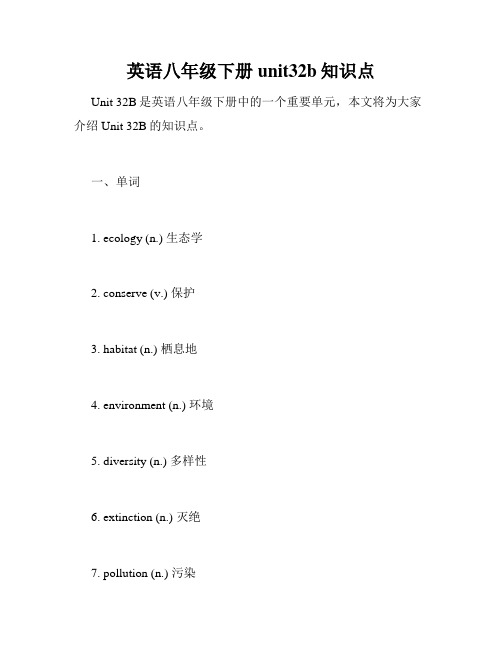
英语八年级下册unit32b知识点Unit 32B是英语八年级下册中的一个重要单元,本文将为大家介绍Unit 32B的知识点。
一、单词1. ecology (n.) 生态学2. conserve (v.) 保护3. habitat (n.) 栖息地4. environment (n.) 环境5. diversity (n.) 多样性6. extinction (n.) 灭绝7. pollution (n.) 污染8. ecosystem (n.) 生态系统9. sustainable (adj.) 可持续的10. renewable (adj.) 可再生的二、短语1. make efforts to do sth. 努力做某事2. in terms of 从...方面来说3. pay attention to 注意4. put sb./sth. at risk 使某人或某物处于危险中5. take action 采取行动三、语法1. the passive voice 被动语态被动语态的构成为:be + 过去分词,被动语态的主语是动作的承受者。
例如:The forest was destroyed by the fire. 森林被火烧毁了。
2. 带to的不定式带to的不定式作为主语、宾语、表语或后置定语,常用于以下句型:It + be + adj. + to do sth.It is important to protect the environment. 保护环境很重要。
三、阅读本单元的阅读部分主要介绍了气候变化和环境保护方面的问题,要提高阅读理解能力,需要多进行阅读。
四、写作本单元的写作部分要求学生写一篇介绍保护环境的文章。
为了更好地完成这个任务,需要掌握一些写作技巧:1.遵循文体要求,使用恰当的语言结构。
2.提出明确的观点和理由。
3.精心组织文章,让文章更易于阅读。
4.检查拼写和语法错误。
u3)八下 英语 知识点
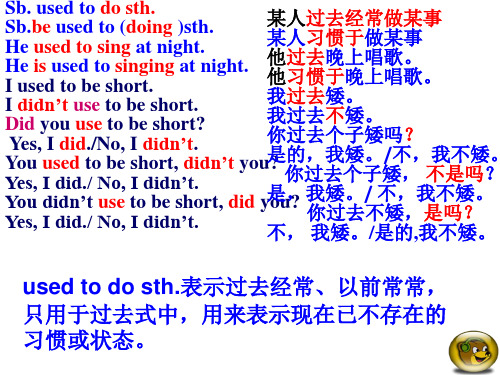
Sb. used to do sth. 某人过去经常做某事 Sb.be used to (doing )sth. 某人习惯于做某事 He used to sing at night. He is used to singing at night. 他过去晚上唱歌。 他习惯于晚上唱歌。 I used to be short. 我过去矮。 I didn’t use to be short. 我过去不矮。 Did you use to be short? 你过去个子矮吗? Yes, I did./No, I didn’t. 是的,我矮。/不,我不矮。 You used to be short, didn’t you? 你过去个子矮, 不是吗? Yes, I did./ No, I didn’t. 是,我矮。/ 不,我不矮。 You didn’t use to be short, did you? 你过去不矮,是吗? Yes, I did./ No, I didn’t. 不, 我矮。/是的,我不矮。
惊奇 为某人举办 惊奇晚会 22. adv.正恰恰 23.即使 25.对…感到自豪 26. n.注意 27.对…(更)注意 28.放弃(它/他们) 放弃干某事 不要放弃 29.v.浪费(时间/水) 30.不再 我们不再去那儿了。 2种 31.默里
I used to be afraid of the dark. 我过去常常害怕黑暗. appearance /personality 外貌/ 个性、品格 Tom is tall.(short短,矮/long长的) 汤姆个子矮。 What does Tom look like? 汤姆长什么样? =What’s he like? 2种 像…指外貌/指外貌和品质 look like/be like She used to have straight hair. 她过去留直发。 What did she use to be/look like? 她过去长什么样? outgoing- shy/quiet 外向/反义词 玛利亚,你过去个子矮, Mario, you used to be short, didn’t you? Yes, I did. 不是吗?是的。 Now he’s tall. 现在他高。 He used to wear glasses. 他过去戴眼镜。 艾米过去个子高。 Amy used to be tall. She used to have short hair. 她过去留短发。 Tina used to have red 蒂娜过去留 and curly hair. 红卷发 两副眼镜 two pairs of glasses curly-curlier=curliest curly的比较/最高级
英语八年级下册第三单元知识点总结

Unit 3. Could you please clean your room?一、短语动词1、take out 带出去;取出;拔出;除掉动副词组代词作宾语时必须放在两词之间。
2、come over 固定短语过来,顺便来访,拜访。
后面加介词to,后接表示地点的名词作宾语。
拓展:take out of 把---从---取出/带出3、hang →hung→hung hang out 闲逛;溜达。
4、throw down扔下;随手丢下其中throw可用作及物或不及物动词,意为扔,掷→threw→thrown拓展:throw at向----扔去(带有攻击性)throw to 扔给---(不含恶意)throw away扔掉SectionB1、take care of 照顾;照料。
相当于look after后可接名词、(反身)代词作宾语。
Take good care of相当于look after well2、二、动词用法1、finish 及物动词完成后跟名词、代词或动词ing形式作宾语。
拓展:与finish一样用法的动词或动词短语有:enjoy/look forward to/mind/have fun/practice/be busy/consider/feel like/give up2、pass用作及物动词给;递;pass sb sth =pass sth to sb把某物递给某人。
走过、通过(考试等)作不及物动词,(时间)过去,流逝3、borrow sth from sb向某人借某物。
非延续性动词Lend(lent;lent) sb sth=lend sth to sb借给某人某物。
非延续性动词Keep 由“保存”引申为“借”,延续性动词,可与时间段连用。
四川-----Excuse me,can I_____your pen?-----sorry,I have_____it to Bob.A.borrow;lendB.borrow;borrowedC.lend;borrowedD.lend;lent4、hate及物动词厌恶;讨厌,表示一种感情或心理状态,不能用于进行时态。
八年级英语下册第三单元笔记

八年级英语下册第三单元笔记一、重点单词。
1. rubbish.- n. 垃圾;废弃物。
例如:There is a lot of rubbish on the street.(街道上有很多垃圾。
)2. fold.- v. 折叠;对折。
如:Fold the paper in half.(把纸对折。
)3. sweep.- v. (swept, swept) 扫;打扫。
例如:I sweep the floor every day.(我每天扫地。
)4. floor.- n. 地板;地面。
如:The book is on the floor.(书在地板上。
)5. mess.- n. 杂乱;不整洁。
例如:What a mess!(多么杂乱啊!)6. throw.- v. (threw, thrown) 扔;掷。
例如:Don't throw rubbish everywhere.(不要到处扔垃圾。
)7. neither.- adv. 也不。
用于否定句中,表示前面所说的情况也适用于后者。
例如:He doesn't like apples, neither do I.(他不喜欢苹果,我也不喜欢。
)- pron. 两者都不。
例如:Neither of them is right.(他们两个都不对。
)8. shirt.- n. 衬衫。
如:This is a white shirt.(这是一件白色的衬衫。
)9. pass.- v. 给;递;走过;通过。
例如:Pass me the salt, please.(请递给我盐。
);He passed the exam.(他通过了考试。
)10. borrow.- v. 借;借用。
例如:Can I borrow your pen?(我能借用你的钢笔吗?)11. lend.- v. (lent, lent) 借给;借出。
例如:I can lend you some money.(我可以借给你一些钱。
初中英语人教新目标八年级下册Unit 3 SectionA预习指导(知识点+练习题)
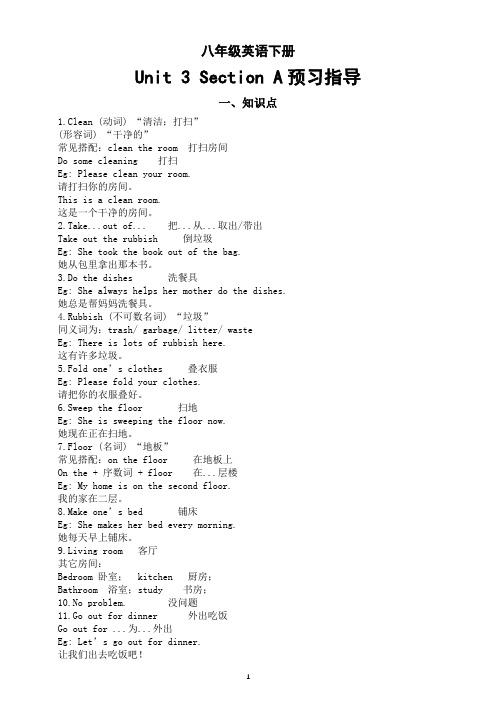
八年级英语下册Unit 3 Section A预习指导一、知识点1.Clean (动词) “清洁;打扫”(形容词) “干净的”常见搭配:clean the room 打扫房间Do some cleaning 打扫Eg: Please clean your room.请打扫你的房间。
This is a clean room.这是一个干净的房间。
2.Take...out of... 把...从...取出/带出Take out the rubbish 倒垃圾Eg: She took the book out of the bag.她从包里拿出那本书。
3.Do the dishes 洗餐具Eg: She always helps her mother do the dishes.她总是帮妈妈洗餐具。
4.Rubbish (不可数名词) “垃圾”同义词为:trash/ garbage/ litter/ wasteEg: There is lots of rubbish here.这有许多垃圾。
5.Fold one’s clothes 叠衣服Eg: Please fold your clothes.请把你的衣服叠好。
6.Sweep the floor 扫地Eg: She is sweeping the floor now.她现在正在扫地。
7.Floor (名词) “地板”常见搭配:on the floor 在地板上On the + 序数词 + floor 在...层楼Eg: My home is on the second floor.我的家在二层。
8.Make one’s bed 铺床Eg: She makes her bed every morning.她每天早上铺床。
9.Living room 客厅其它房间:Bedroom 卧室; kitchen 厨房;Bathroom 浴室;study 书房;10.No problem. 没问题11.Go out for dinner 外出吃饭Go out for ...为...外出Eg: Let’s go out for dinner.让我们出去吃饭吧!12.Go to the movies 去看电影类似词组:see the film 看电影Eg: They went to the movies last night.他们昨晚去看电影了。
人教版八年级下册英语第三单元知识点

人教版八年级下册英语第三单元知识点Unit 3 Could you please clean your room?一、重点短语1.go out for dinner出去吃饭2.stay out late在外面待到很晚3.go to the movies去看电影4.geta ride搭车5.work on从事6.cleanand tidy干净洁7.do the dishes洗餐具8.takeout the rubbish倒垃圾9.fold your/the clothes叠衣服10.sweepthe floor扫地11.make your/the bed整理床铺12.cleanthe living room打扫客厅13.no problem没问题14.welcomesb.欢迎某人e home fro m school/work放学/下班回家16.throw down扔下17.sit down坐下eover过来19.take sb.for a walk带某人去散步20.all the time总是21.all day/evening整日/夜22.dohousework做家务23.shout back大声回应24.walkaway走开25.a comfortable home一个舒适的家26.share the housework分担家务27.get some thing to drink拿点喝的东西28.insurprise惊讶地29.watch one show观看节目30.hangout闲逛31.pass sb.sth.把某物传给某人32.lend sb.sth.把某物借给某人33.get sth.wet使某物弄湿34.hate to do sth.讨厌做某事35.help sb.to do/with sth帮助某人干某事36.do chores做杂务37.bring a tent带顶帐篷来38.buy some snacks买些小吃39.invite sb to a party邀请某人参加聚会40.go to the store去商店41.make sb.do sth使某人做某事42.enough stress足够的压力43.a waste of time浪费时间44.inorder to为了45.get goodgrades取得好成绩46.minddoing sth.介意做某事47.developchildren’s independence发展孩子的独立性48.dependon依赖49.do ones part in(doing)sth.做某人分内的事50.look after/take care of 照顾;51.finish doing sth.完成做某事二、知识点解析1.“Could you please do sth.?”的答语以下两种情况:接受请求时可以用Yes,sure./Sure./Of course./Certainly./No problem./My pleasure./It’s my pleasure./With pleasure.等来回答拒绝请求时可以用Sorry./Sorry,I can’t.等来回答,还可以用Ihave to do sth.来解释其否定句是:“Could youplease not do sth.?”2.有关“家务劳动”有关的短语:takeout the rubbish/trash倒垃圾foldone’s clothes叠衣服sweepthe floor扫地cleanthe room打扫房间makeone’s/the bed铺床dothe dishes/wash the dishes洗餐具3.throw down扔下throwat扔向,掷向throw away扔掉例题:Recycling is good,so don’t__________bottles or newspapers.A.find outB.hand ine upD.throw away4.the minute表示“一…….就……”,相当于as soon as.(引导时间状语从句)e.g.:I’ll tell himthe minute he gets there.5.常见time的短语:all the time一直,总是at times不时,有时in time及时on time按时forthe first time第一次in no time立刻at any time随时bythe time到...的时候atthe same同时have a good/great/wonderful time玩的愉快例题:---Hurry up.It’s almost time for school.---Don’t worry.We are sure to be atschool__________.A.at timesB.on timeC.all the timeD.by the time6.as….as表示“和……一样”,之间要用形容词或副词的原级。
外研版英语八年级下册Module 3知识点_中考英语
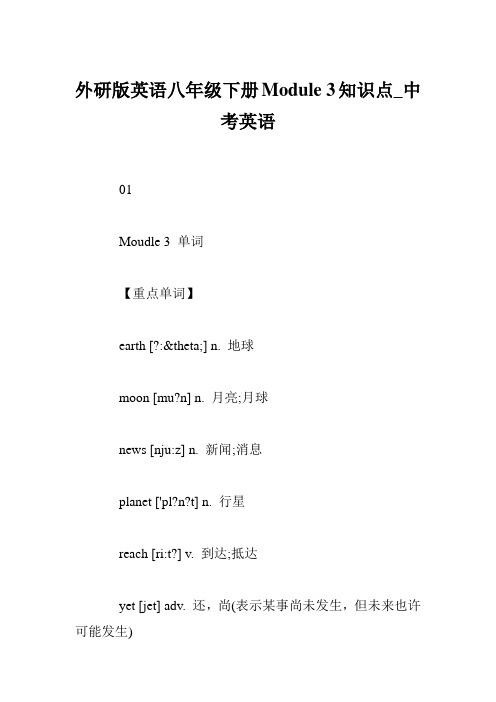
外研版英语八年级下册Module 3知识点_中考英语01Moudle 3 单词【重点单词】earth [?:θ] n. 地球moon [mu?n] n. 月亮;月球news [nju:z] n. 新闻;消息planet ['pl?n?t] n. 行星reach [ri:t?] v. 到达;抵达yet [jet] adv. 还,尚(表示某事尚未发生,但未来也许可能发生)just [d??st] adv. 刚才;刚刚model ['m?dl] n. 模型spaceship [?spe?s??p] n. 航天器;宇宙飞船project [pr??d?ekt] n. 计划;工程;项目no problem [?pr?bl?m] 没问题(用于表示乐于做某人要求做的事)latest [?le?t?st] adj. 最近的;最新的on [?n] prep. 在(播放)中;关于...discover [d?'sk?v?(r)] v. 发现;找到astronaut [??str?n?:t] n. 宇航员space travel [spe?s] [?tr?vl] 航天旅行none [n?n] prop. 没有一人;没有一个environment [?n'va?r?nm?nt] n. 环境that [e?t] pron. 那;那个(前面已提及的事物)solar ['s??l?(r)] adj. 太阳的;与太阳有关的system ['s?st?m] n. 系统;体系solar system 星系;(尢指)太阳系group [ɡru:p] n. 群;组galaxy ['ɡ?l?ks?] n. 星系universe [?ju:n?v?:s] n. 宇宙light [la?t] n. 光线;光亮impossible [?m?p?s?bl] adj. (事情)办不到的,不可能的out [a?t] adv. 在远方communicate [k?'mju:n?ke?t] v. 联系;交流02Moudle 3 知识梳理【重点短语】1. What are you up to? 你在干什么?2. the latest news 最新消息3. get information 获得信息4. search for 寻找,搜索5. in order to 为了6. much+比较级...得多7. on earth 在世界上,在人间,究竟,到底8. communicate with sb 与某人交流9. hundreds of 数以百计的10. go around 绕着......走11. billions of 数十亿的12. take photos 拍照13. send...to... 把...送到...14. no problem 没问题15. be far away(from) 离...远16. go online 上网17. search for 搜索18. more than 超过;多余19. look for 寻找20. look like 看起来像21. finish doing sth 做完某事22.no problem 没问题23.space travel 航天旅行24.none of them 没有一个25.have an environment of有..的环境26.solar system 星系;尤指太阳系27.It's (im)possible to do sth 去做这件事是(不)可能的municate with sb 和某人联系29.be up to do sth 忙于做某事30.make a spaceship 制作一个航天器模型【单词考点】Earth n.?地球?【经典例句】The Earth goes round the sun once a year.?地球一年绕太阳一周。
人教版八年级下册英语 Unit 3 单元知识点总结(含练习题及答案)
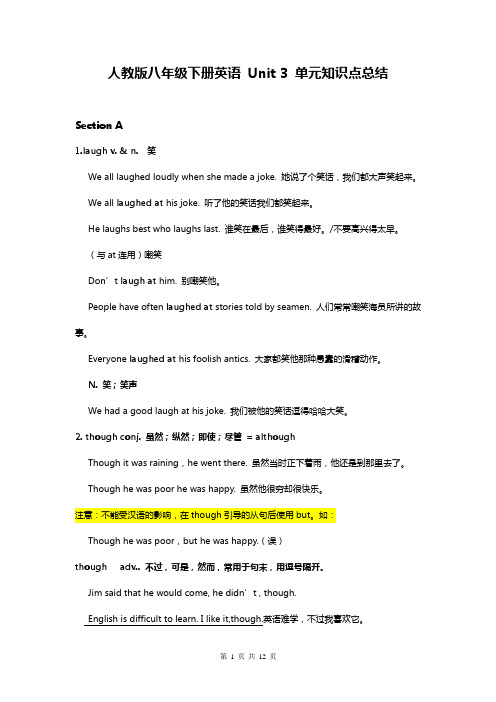
人教版八年级下册英语Unit 3 单元知识点总结Section Augh v. & n. 笑We all laughed loudly when she made a joke. 她说了个笑话,我们都大声笑起来。
We all laughed at his joke. 听了他的笑话我们都笑起来。
He laughs best who laughs last. 谁笑在最后,谁笑得最好。
/不要高兴得太早。
(与at连用)嘲笑Don’t laugh at him. 别嘲笑他。
People have often laughed at stories told by seamen. 人们常常嘲笑海员所讲的故事。
Everyone laughed at his foolish antics. 大家都笑他那种愚蠢的滑稽动作。
N. 笑;笑声We had a good laugh at his joke. 我们被他的笑话逗得哈哈大笑。
2. though conj. 虽然;纵然;即使;尽管= althoughThough it was raining,he went there. 虽然当时正下着雨,他还是到那里去了。
Though he was poor he was happy. 虽然他很穷却很快乐。
注意:不能受汉语的影响,在though引导的从句后使用but。
如:Though he was poor,but he was happy.(误)though adv.. 不过,可是,然而,常用于句末,用逗号隔开。
Jim said that he would come, he didn’t , though.English is difficult to learn. I like it,though.英语难学,不过我喜欢它。
3. quietly轻声地,安静地,平静地quiet轻声的,安静的,平静的The students walked to a quiet place.同学们向一个安静的地方走去。
八年级下册英语_Unit3_第三单元笔记+练习
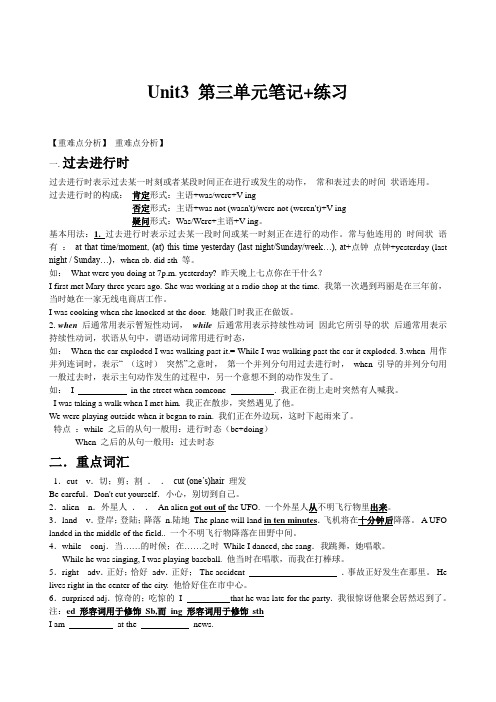
Unit3 第三单元笔记+练习【重难点分析】重难点分析】一.过去进行时过去进行时表示过去某一时刻或者某段时间正在进行或发生的动作,常和表过去的时间状语连用。
过去进行时的构成:肯定形式:主语+was/were+V-ing否定形式:主语+was not (wasn't)/were not (weren't)+V-ing疑问形式:Was/Were+主语+V-ing。
基本用法:1.过去进行时表示过去某一段时间或某一时刻正在进行的动作。
常与他连用的时间状语有:at that time/moment, (at) this time yesterday (last night/Sunday/week…), at+点钟点钟+yesterday (last night / Sunday…),when sb. did sth 等。
如:What were you doing at 7p.m. yesterday? 昨天晚上七点你在干什么?I first met Mary three years ago. She was working at a radio shop at the time. 我第一次遇到玛丽是在三年前,当时她在一家无线电商店工作。
I was cooking when she knocked at the door. 她敲门时我正在做饭。
2.when后通常用表示暂短性动词,while后通常用表示持续性动词因此它所引导的状后通常用表示持续性动词,状语从句中,谓语动词常用进行时态,如:When the car exploded I was walking past it.= While I was walking past the car it exploded. 3.when 用作并列连词时,表示“ (这时)突然”之意时,第一个并列分句用过去进行时,when 引导的并列分句用一般过去时,表示主句动作发生的过程中,另一个意想不到的动作发生了。
八年级下册英语第三单元知识点

八年级下册英语第三单元知识点八年级下册的英语第三单元是我们学习英语之旅中的重要一站。
在这个单元里,我们将学习一些重要的语法和词汇知识,以及提高我们的听说读写能力。
下面,我们来一起回顾一下这个单元的知识点。
一、名词的复数形式在英语中,名词的复数形式是非常重要的。
通常,我们可以通过在名词后面加上“-s”来表示复数形式,如books、cats等。
但是也有一些特殊情况,如以“-s”、“-sh”、“-ch”、“-x”或“-o”结尾的名词,复数形式是在名词后面加上“-es”,如boxes、watches、bushes、foxes和tomatoes 等。
二、动词的一般现在时和一般过去时在第三单元里,我们学习了动词的一般现在时和一般过去时的用法。
一般现在时用来表示经常性的动作或现在的状态,我们可以在动词原形后面加上“-s”或“-es”来构成一般现在时,如plays、goes等。
一般过去时用来表示过去发生的事情,我们可以在动词原形后面加上“-ed”或变化其结尾的字母形式来构成一般过去时,如played、went等。
三、形容词的比较级和最高级形容词的比较级和最高级是用来比较不同事物之间的属性或状态的。
通常,我们可以在形容词原形后面加上“-er”来构成比较级,如bigger、happier等。
而构成最高级,我们可以在形容词原形后面加上“-est”,如biggest、happiest等。
但是也有一些特殊形式,如good、bad和far等,它们的比较级和最高级分别是better、worse和farther/further。
四、名词所有格名词所有格表示某物属于某人或某事物的所有关系。
通常,我们可以在名词后面加上“-’s”来表示名词所有格,如John’s book。
如果名词是以“-s”结尾的复数形式,我们只需要在名词后面加上一个撇号“’”来表示名词所有格,如the students’ books。
五、句子的倒装结构在某些情况下,句子的主语和谓语动词的位置可以交换,这就是句子的倒装结构。
八下英语三单元知识点总结
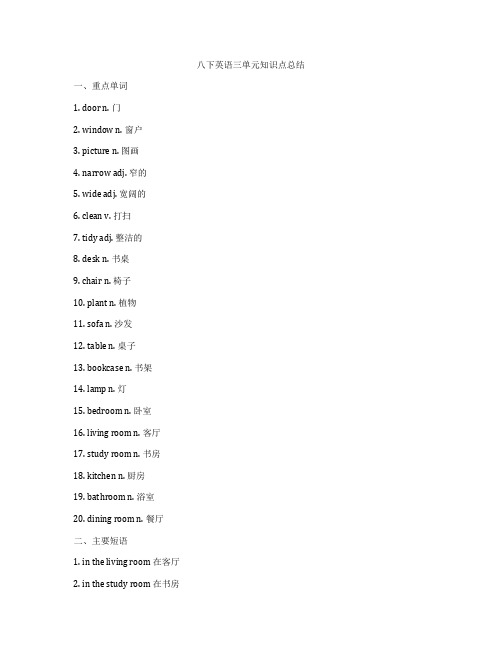
八下英语三单元知识点总结一、重点单词1. door n. 门2. window n. 窗户3. picture n. 图画4. narrow adj. 窄的5. wide adj. 宽阔的6. clean v. 打扫7. tidy adj. 整洁的8. desk n. 书桌9. chair n. 椅子10. plant n. 植物11. sofa n. 沙发12. table n. 桌子13. bookcase n. 书架14. lamp n. 灯15. bedroom n. 卧室16. living room n. 客厅17. study room n. 书房18. kitchen n. 厨房19. bathroom n. 浴室20. dining room n. 餐厅二、主要短语1. in the living room 在客厅2. in the study room 在书房3. next to the sofa 沙发旁边4. on the desk 在书桌上5. under the chair 在椅子下面6. clean the window 擦窗户7. tidy the bedroom 整理卧室8. put the books on the bookcase 把书放在书架上9. water the plants 浇花10. watch TV 看电视三、语法知识点1. be动词的一般现在时I am a student. 我是学生。
You are my friend. 你是我的朋友。
He is a teacher. 他是一名老师。
2. have的用法have的一般现在时为has,表示“有”。
I have a book. 我有一本书。
She has a pet. 她有一只宠物。
3. there be 结构There is a cat on the table. 桌子上有一只猫。
There are some books on the bookcase. 书架上有一些书。
Unit 3知识点精析(下)+课文注释人教版英语八年级下册

人教版丨初中英语八年级下册Unit 3知识点精析(下)+课文注释1.invite my friends to a party邀请我的朋友们来参加聚会要点精析invite为及物动词,意为“邀请”。
invite sb.to do sth.意为“邀请某人做某事”。
例:We invited all our friends.我们邀请了我们所有的朋友。
Kate invited me to go to the movies with her.凯特邀请我和她一起去看电影。
知识拓展invite 的名词形式为invitation,意为“邀请;请帖”。
例:Thank you for your kind invitation.谢谢你的盛情邀请。
2. I do not understand why some parents make their kids help with housework and chores at home.我不理解为什么一些父母让他们的孩子在家帮忙做家务。
要点精析make their kids help with housework and chores 是 make sb. do sth.结构,此结构意为“让/使某人做某事”。
例:This good news made her laugh happily.这个好消息使她开心地笑了。
3.Housework is a waste of their time.(做)家务是浪费他们的时间。
要点精析a waste of...意为“浪费……”,其中waste是名词,意为“浪费;滥用”。
例:Playing computer games is a waste of time.玩电脑游戏是浪费时间的。
知识拓展waste还可作动词,意为“浪费”。
例:Don't waste your money on clothes.别把你的钱浪费在衣服上。
4. They should spend their time on schoolwork in order to get good grades and get into a good university.为了取得好成绩,进入一所好大学,他们应该把他们的时间花在学业上。
人教版八下英语第三单元Unit 3 知识点归纳

Unit3 Could you please clean your room?重点知识归纳一、短语归纳1.go out for dinner 出去吃饭2.stay out late 在外面待到很晚3.go to the movies 去看电影4.get a ride 搭车5.work on 从事6.finish doing sth. 完成做某事7.clean and tidy 干净整洁的8.do the dishes 洗餐具9.take out the rubbish 倒垃圾10.fold your/the clothes 叠衣服11.sweep the floor 扫地12.make your/the bed 整理床铺13.clean the living room 打扫客厅14.no problem 没问题15.welcome sb. 欢迎某人e home from school/work放学/下班回家17.throw down 扔下18.sit down 坐下e over 过来20.take sb. for a walk 带某人去散步21.all the time 一直;总是22.all day/evening 整日/夜23.do housework 做家务24.shout back 大声回应25.walk away 走开26.share the housework 分担家务27.a comfortable home 一个舒适的家28.in surprise 惊讶地29.get something to drink 拿点喝的东西30.watch one show 观看一个节目31.hang out 闲逛32.pass sb. sth. 把某物传给某人33.lend sb. sth. 把某物借给某人34.get sth. wet 使某物弄湿35. hate to do sth. 讨厌做某事36.do chores 做杂务37.help sb. (to ) do /with sth.帮助某人干某事38.bring a tent带顶帐篷来39.buy some snacks买些小吃40.go to the store去商店41.invite sb. to a party邀请某人参加聚会42.make sb. do sth. 使某人做某事43.enough stress足够的压力44.a waste of time浪费时间45.in order to为了46.get good grades取得好成绩47.mind doing sth. 介意做某事48.depend on依赖;依靠49.develop children ’ s independence发展孩子的独立性50.look after/take care of 照顾;照看51.do one’ s part in (doing ) sth. 尽某人的职责二、用法归纳1.finish doing sth. 做完某事2.want sb. to do sth. 想要某人做某事3.try (not) to do sth. 尽力(不)做某事4.let sb. do sth. 让某人做某事5.spend......(in) doing sth. 花费......做某事6.mind doing sth. 介意做某事7.learn to do sth. 学习做某事8.learn how to do sth. 学习怎样做某事9.The +比较级,the+比较级越......,就越.....三、词句精讲1.Could you please take out the rubbish? 你能把垃圾倒了吗?Could you please do sth ?请你(做)......好吗?用于提出请求,希望得到对方的肯定回答,说话的语气比较客气委婉。
八年级下册人教版英语unit3知识点
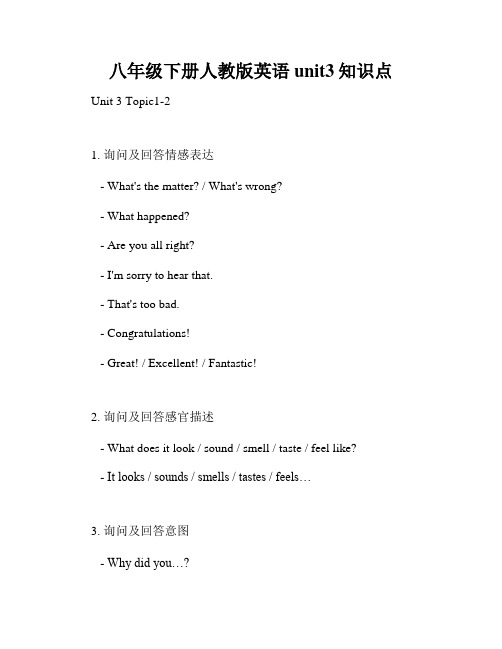
八年级下册人教版英语unit3知识点Unit 3 Topic1-21. 询问及回答情感表达- What's the matter? / What's wrong?- What happened?- Are you all right?- I'm sorry to hear that.- That's too bad.- Congratulations!- Great! / Excellent! / Fantastic!2. 询问及回答感官描述- What does it look / sound / smell / taste / feel like?- It looks / sounds / smells / tastes / feels…3. 询问及回答意图- Why did you…?- What are you going to …?- What do you intend to…?- I intend to… / I plan to…4. 问路及指路,口语表达中熟悉的方向词汇- Excuse me, could you tell me the way to…?- How can I get to…?- The nearest bus stop / subway station / bank / post office is… - It's on the left / right / opposite…Unit 3 Topic 3-41. 表达偏好及兴趣- Would you like…?- What kind of…do you like?- Do you prefer…to…?- I'm into…- I'm fond of…- I enjoy…2. 指出和辨认物品及人物(描述外貌和服装)- What does he / she look like?- He / She has…(描述头发颜色、眼睛、身材特征、穿戴等)3. 询问及描述活动安排- What are you going to do…?- What will you do…?- I'll…4. 描述天气- What's the weather like today?- It's sunny / cloudy / rainy / snowy / windy…- It's hot / warm / cool / cold…Unit 3 Topic 5-61. 表示和理解时间和星期- What time is it?- What's the date today?- What day is it today?- How many days are there in a week?- What do you usually do on weekends?2. 描述行程及活动- Tomorrow, I'm going to…(描述行程)- On Monday / Tuesday / Wednesday…, I usually… - In the morning / afternoon / evening / at night…, I…3. 询问及回答感受- How do you feel?- I feel…(描述感受)4. 描述位置- Where is the…? It's…(描述方位)以上是八年级下册人教版英语unit3的知识点总结,有效巩固这些知识点,可以让你在英语学习中更加得心应手。
八下英语第三单元知识梳理

八下英语第三单元知识梳理以下是八下英语第三单元的知识梳理:一、重点短语:take a photo 拍照in the corner 在角落里on the right 在右边on the left 在左边in front of 在……前面behind 在后面next to 紧挨着turn left/right 左转/右转go straight 直走cross the road 穿过马路wait for a while 等一会儿look for a while 看一会儿二、重点句型:1、Excuse me, where is the nearest post office? 请问,最近的邮局在哪里?2、Could you tell me the way to the train station? 你能告诉我去火车站的路吗?3、Go along the street and turn left at the first crossing. 沿着这条街走,在第一个十字路口左转。
4、It's next to the bank. 它挨着银行。
三、重点语法:1、问路和指路的表达方式。
例如:where is the nearest post office? how can I get to the train station?等等。
2、表示位置的介词,如:in, on, next to, behind, in front of等等。
四、重点单词:这个单元的单词包括各种地点名词,如bank,post office,library,train station等等,以及表示位置和方向的介词和短语。
八年级初二英语unit3知识点
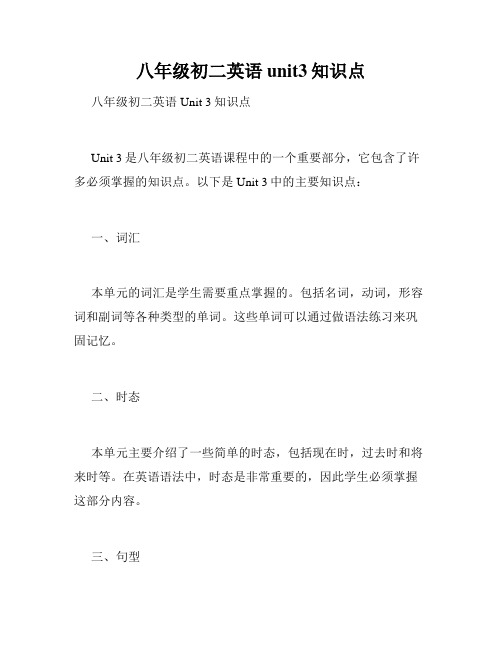
八年级初二英语unit3知识点八年级初二英语Unit 3知识点
Unit 3是八年级初二英语课程中的一个重要部分,它包含了许多必须掌握的知识点。
以下是Unit 3中的主要知识点:
一、词汇
本单元的词汇是学生需要重点掌握的。
包括名词,动词,形容词和副词等各种类型的单词。
这些单词可以通过做语法练习来巩固记忆。
二、时态
本单元主要介绍了一些简单的时态,包括现在时,过去时和将来时等。
在英语语法中,时态是非常重要的,因此学生必须掌握这部分内容。
三、句型
本单元主要介绍了一些基本的英语句型,例如祈使句,疑问句等。
学生需要掌握这些句型,并且在实际使用中熟练运用。
四、语法
本单元主要介绍了几种基本的语法规则,包括名词性从句,简单句,复合句等。
语法规则是英语学习的重点,因此学生需要认真学习这部分内容。
五、阅读
阅读是学习任何语言都必须掌握的技能之一。
本单元提供了一些适合初学者阅读的材料,学生需要通过阅读来提高自己的英语水平。
六、写作
本单元还包括一些写作练习,例如写作话题和写作明信片等。
这些练习是帮助学生提高编写英语文章的能力,并通过书写来加深对词汇和语法的理解。
综上所述,Unit 3是八年级初二英语学习的重要部分,它包含了许多必须掌握的知识点。
学生需要耐心学习并反复练习,以便更好地掌握这些知识点并提高自己的英语水平。
英语八年级下(人教版)第三单元重点知识总结
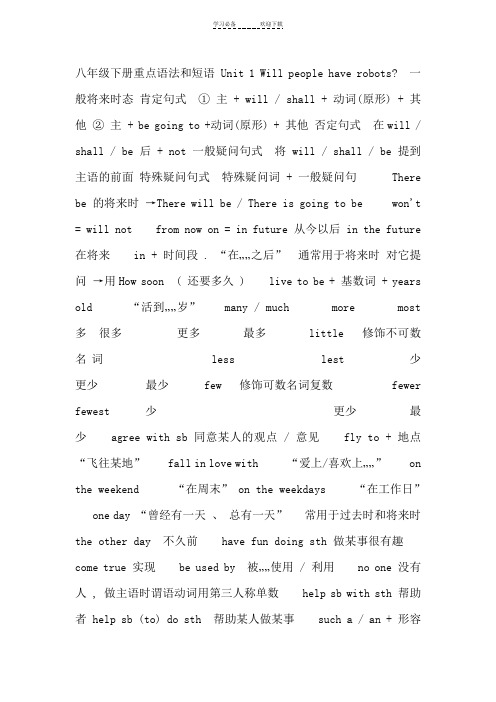
八年级下册重点语法和短语 Unit 1 Will people have robots? 一般将来时态肯定句式主 + will / shall + 动词(原形) + 其他②主 + be going to +动词(原形) + 其他否定句式will /shall / be 后 + not 一般疑问句式will / shall / be 提到主语的前面特殊疑问句式 + 一般疑问句 Therebe 的将来时→There will be / There is going to be won't= will not from now on = in future 从今以后 in the future在将来 in + 时间段 . “在……之后”通常用于将来时对它提问→用How soon ( 还要多久 ) live to be + 基数词 + yearsold “活到……岁” many / much more most 多更多最多 littleless lest 少更少最少 few fewer fewest 少更少最少 agree with sb 同意某人的观点 / 意见 fly to + 地点“飞往某地” fall in love with “爱上/喜欢上……” onthe weekend “在周末” on the weekdays “在工作日”one day “曾经有一天、总有一天”the other day 不久前 have fun doing sth 做某事很有趣come true 实现 be used by 被……使用 / 利用 no one 没有人 , 做主语时谓语动词用第三人称单数 help sb with sth 帮助者 help sb (to) do sth 帮助某人做某事 such a / an + 形容词 + 可数名词单数“如此 / 这样的一个……” try to dosth 尽力做某事 try doing sth 尝试做某事 be able to dosth. = can do sth能够做某事 hundreds of 数以百计的 ,大量的 thousands of 数以千计的 look for 寻找the same as 和……一样 be different from 和……不同 It is + 形容词 + for sb to do sth Wake up 醒来 Make sb do sth 让某人做某事Unit 2 What should I do? 重点语法should ,would都可以用来提出建议 Should / would +动词原形“应该 / 可以做……”重点短语 1、 be in style 流行的 be out of style 过时了 2、 write sb a letter =write a letter to sb 给某人写一封信 3、 call sb up 给某人打电话 = make a call to sb 4、be surprised at……对……感到吃惊、 to one’s surprise, 使某人吃惊的是…… 5、argue with sb 与某人争论 / 辩论 argue about sth 为某事争论 6、pay for sth 支付 sb pay + 钱for sth 某人花了多少钱买…… 7、have no idea 不知道 8、borrow sth from sb 向某人借东西 lend sth to sb 把某物借给某人 9、ask sb for sth 向某人要…… ask sb todo sth. 请求某人做某事 ask sb not to do s th. 请求某人不要做某事 10、buy sb sth = buy sth for sb 给某人买某物 11、 the same + 名词 + as 和……一样…… thesame as 和……一样 be different from 与……不同12、be popular with 受……的欢迎 13、find out 找出look for 寻找 14、invite sb to do sth 邀请某人做某事 15、be angry with sb 对某人生气 be angry at sth 对某事生气 16、get on well with sb / sth 与……相处得好7、have a fight with sb 和某人打架 18、give sb some advice 给某人一些建议 19、not …… untill 直到……才 20、 fit ……into 安排时间做…… 21、complain about doing sth 抱怨做…… 22、compare A with B 把A和B相比 compare A to B 把A比作 B 23、all kinds of 各种各样的 24、on the one hand , on the other hand , ……。
人教版八年级下册英语Unit 3单元语法知识点总结

人教版八年级下册英语Unit 3单元语法知识点总结本单元重点短语的具体用法1. do the dishes:洗餐具- I need to do the dishes before going out.(我出门前需要洗餐具。
)2. take out the rubbish:倒垃圾- Can you take out the rubbish, please?(你能倒一下垃圾吗?)3. fold your clothes:叠衣服- Remember to fold your clothes neatly.(记得把你的衣服叠整齐。
)4. sweep the floor:扫地- She sweeps the floor every day.(她每天都扫地。
)5. make your bed:整理床铺- It's your turn to make your bed.(轮到你整理床铺了。
)6. clean the living room:打扫客厅- We need to clean the living room before guests arrive.(在客人到来之前,我们需要打扫客厅。
)7. go out for dinner:出去吃饭- Let's go out for dinner tonight.(我们今晚出去吃饭吧。
)8. go to the movies:去看电影- They like to go to the movies on weekends.(他们喜欢在周末去看电影。
)9. stay out late:在外面待到很晚- Don't stay out late, it's not safe.(别在外面待太晚,不安全。
)10. get a ride:搭车- I'll get a ride with my friend.(我会和我朋友一起搭车。
)11. work on doing sth:从事做某事- He is working on writing a novel.(他正在写一本小说。
- 1、下载文档前请自行甄别文档内容的完整性,平台不提供额外的编辑、内容补充、找答案等附加服务。
- 2、"仅部分预览"的文档,不可在线预览部分如存在完整性等问题,可反馈申请退款(可完整预览的文档不适用该条件!)。
- 3、如文档侵犯您的权益,请联系客服反馈,我们会尽快为您处理(人工客服工作时间:9:00-18:30)。
Unit 3
1.委婉请求别人干…Could/Will/Would you please do….?
Yes,you can./OK/Yes,sure/Certainly/Of course/No problem/with pleasure
No/Sorry.I can’t. I must/have to do…./I’m doing ….
2.请求别人的许可Could I do…..
Yes, sure./All right./No problem /Certainly/ Of course /OK./Yes,you can. Sorry/No, (I’m afraid)you can’t. you must do..... You’d better not. +借口3.折衣服fold the clothes倒垃圾take out the rubbish/trash
把….从….拿出来take …out of …. 整理床铺make the bed 洗碗
do the dishes 做杂务活do chores/housework 出去吃饭go out for dinner 晚归stay out late 搭便车get a ride 让某人搭便车give sb a ride
4.你能帮助做一些事情吗?Could you please help out with a few things?
5.时间金钱距离做主语当单数看待。
Two hours of TV is e nough. Four kilometers is not far.
6. 随时any minute now 从…回来be/come back from…
解决问题solve the problem 遛狗take the dog for a walk
扔下throw down…. 扔掉throw away…把…扔进…throw …in(to)…
7. 我与你一样累I’m as tired as you (are)
8.一…就…: as soon as/the minute+时间状语从句
The minute he came back,he began to make dinner.
=He began to make dinner as soon as he came back.
9.过来come over 顺便到访come over to sp
10.neigher的用法:①neither +助动词+sb : 某人也一样不…(而肯定的用so+助动词+sb) Eg: Bill doesn’t like math, neither do I.
②adj.+名单“两个都不….”做主语当单数
Eg:Neither answer is right.两个答案都不正确
③neither of ….做主语当单数.Eg:Neither of them is right. 他们两都不正确
④neither…nor….既不也不(链接两个并列成分,如链接两个主语,谓语用就近原则判断)
Neither he nor I am a worker.=Neither I nor he is a worker.
I can neither sing or dance. He is from neither Beijing nor Shanghai.
11.waste①adj 废的,无用的waste paper
②Vt 浪费…Don’t waste water./money
③waste time doing sth:浪费时间做…
Eg:Don’t waste time playing computer games.
④un.浪费 a waste of ….Homework is a waste of time.
12.in order (not )to do sth.为了(不)做某事
I study hard in order to get a good job in the future.
13.进入一个好大学get into a good university.
14.某人没有必要做某事There’ s no need for sb to do sth.
=It’s not necessary for sb to do sth
There is no need for us to waste time
=It’s not necessary for us to waste time.
15.为某人提供…provide sb with sth=provide sth for sb
Parents should provide healthy food for their children.
= Parents should provide their children with healthy food .
16.不管怎样anyway. 17. 我不知道I don’t know=I’ve no idea. 18.在某方面尽某人的职责do one’s part in…
Every one should do his part in protecting the environment.
19.结果as a result. 现在的孩子children these days
20. 理解公平的观点understand the idea of fairness.
21.发展/提高孩子的独立性develop children’s independence.
22.依靠depend on :Don’t depend on your parents all the time.
23.不介意做某事not mind doing sth Eg:I don’t mind smoking here.。
